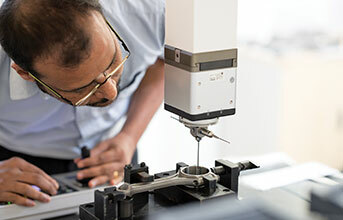
Aveen Padmaprabha, Head of Industrial Quality Solutions, Carl Zeiss India (Bangalore) Pvt. Ltd.
Why is training so crucial in metrology implementation?
Training is pivotal for the successful implementation of metrology across any organisation. It serves as the foundation upon which accuracy, compliance, and innovation thrive. Fundamentally, metrology involves principles of physics and mathematics, coupled with the use of complex instruments and software. Training ensures that personnel grasp these concepts and tools thoroughly, enabling them to achieve precise and reliable measurement results. It also plays a crucial role in maintaining consistency and reliability in measurements across various conditions and locations. By educating employees on proper calibration and measurement procedures, training safeguards the integrity of measurement processes. This not only enhances operational efficiency but also minimises errors that can lead to costly mistakes.
In industries governed by stringent regulatory standards—such as aerospace, pharmaceuticals, and manufacturing—metrology training is indispensable. It equips personnel with the knowledge and skills needed to comply with these regulations rigorously. Adhering to these regulations not only mitigates legal risks but also upholds the high quality and reliability of products and services delivered.
Beyond compliance and precision, training in metrology fosters innovation. A deep understanding of metrology principles empowers employees to explore new measurement techniques and refine existing ones. This innovative spirit drives improvements in product design, enhances overall quality, and boosts operational performance.
In today's interconnected global economy, interoperability of measurements across different geographical locations is vital. Metrology training, aligned with international standards, ensures consistency and reliability in measurements. This facilitates smooth international trade and collaboration, bolstering organisational competitiveness and reputation.
What is the typical training process for new metrology personnel?
The training process at ZEISS Academy Metrology is designed to empower metrology professionals with comprehensive skills and knowledge essential for precise measurement tasks. The journey begins with foundational courses covering basic metrology, including measurement techniques and standards. These courses provide a strong theoretical grounding, which is then reinforced through practical exercises using ZEISS metrology equipment and software.
As trainees progress, they can choose from four customised learning paths based on their current knowledge and specific application needs. These paths guide them through increasingly specialised topics such as software-based training for mastering ZEISS software tools and technology-based training focused on efficient device and sensor usage.
ZEISS Academy Metrology offers various learning formats to accommodate different preferences and needs, including classroom training at over 60 locations worldwide, live online sessions, and individual on-site support. Upon completion of each training course, participants receive globally recognised certificates, validating their expertise in metrology.
Continuous learning is emphasised through e-learnings, apps, and e-books, allowing metrologists to stay updated independently and apply their knowledge effectively in real-world scenarios. This structured approach not only enhances technical proficiency but also supports industry-specific challenges, ensuring metrology labs perform optimally and contribute to maintaining global quality standards.
How has the advancement of technology influenced the training and support needed in metrology?
Traditionally focused on mastering measurement techniques and equipment operation, modern metrology training now integrates sophisticated software and cutting-edge hardware capabilities. This shift demands a more dynamic approach to education, where understanding complex algorithms, data analytics, and digital integration becomes crucial.
Today, metrology training programs must incorporate comprehensive instruction on utilising advanced software functionalities for data analysis, visualisation, and interpretation. Training modules now emphasise not just operating hardware but also understanding how to leverage digital interfaces and automated systems effectively. This ensures that technicians can extract meaningful insights from large datasets and optimise measurement processes in real time.
Moreover, the proliferation of smart sensors, IoT connectivity, and cloud-based solutions has expanded the scope of metrology training to include cybersecurity protocols and data management best practices. Technicians are now trained to safeguard sensitive data and ensure compliance with stringent regulatory requirements across different industries.
The evolution of technology also necessitates ongoing education and upskilling initiatives. Metrology professionals must stay abreast of technological updates and advancements through continuous professional development programs. These programs not only enhance technical proficiency but also cultivate a mindset of innovation and adaptability in response to emerging technologies.

How can one ensure the training and support practices keep up with the evolving field of metrology?
Our strategy for keeping abreast of the evolving metrology landscape revolves around a proactive and comprehensive approach. By seamlessly integrating our research and development initiatives with our training programs, we ensure that advancements in metrology devices and software are swiftly reflected in our training materials. This enables us to deliver timely and relevant training whenever our clients adopt new products or updates.
Understanding our clients' evolving needs is paramount. Through continuous engagement and feedback, we gain valuable insights into their challenges and requirements. This insight-driven approach allows us to tailor our training solutions dynamically, ensuring they meet the real-world demands of the metrology industry effectively. We have established a metrology community—the #measuringhero—where our customers can directly ask critical questions, share best practices, and connect with other metrology professionals.
Collaboration is a cornerstone of our strategy. By forging strategic partnerships with academic institutions and industry alliances, we remain at the forefront of emerging trends and technologies in metrology. These collaborations enable us to align our training programs with the latest industry standards and best practices, ensuring our clients receive cutting-edge education.
Regular assessment and refinement of our training materials are crucial. By continuously evaluating the effectiveness of our training practices and incorporating user feedback, we adapt swiftly to changes in metrology advancements. This iterative improvement process guarantees that our training and support practices evolve in tandem with the dynamic field of metrology, empowering our clients with enduring knowledge and capabilities.
What are some common mistakes companies make in metrology implementation and how can good training and support help avoid these?
Some companies encounter common pitfalls in metrology implementation that can be mitigated through effective training and support. A primary issue is the neglect of calibration, where instruments drift without regular adjustment, leading to unreliable measurements. Proper training emphasises the importance of calibration routines, ensuring accurate and consistent results. Environmental factors such as temperature, humidity, and vibrations sometimes go overlooked, affecting measurement precision. Comprehensive training programs educate employees on these influences and provide strategies to minimise their impact, maintaining accuracy. These two issues are addressed in our basic metrology training. Another critical mistake is poorly defined measurement processes, which result in inconsistencies across operations. Structured training imparts clear guidelines for creating and adhering to standardised measurement protocols, promoting uniformity. Misinterpretation of measurement data due to inadequate understanding of metrology principles is also common. Training in fundamental concepts and specific techniques enhances personnel's ability to interpret data accurately, supporting informed decision-making.
Additionally, underestimating the complexity of metrology software can lead to erroneous results. Thorough training in software functionalities ensures proper utilisation, enhancing measurement accuracy.
Lastly, robust support systems are essential to address queries promptly during implementation, preventing confusion and errors. By integrating these elements into training and support frameworks, companies can optimise metrology practices, improving overall reliability and efficiency.
How does effective training and support contribute to quality control in metrology?
Effective training and support are integral to quality control in metrology, significantly enhancing measurement accuracy, reliability, and consistency. Comprehensive training programs ensure personnel grasp core metrology principles and understand the specific functionalities of equipment and software. This knowledge empowers them to achieve precise measurements, crucial for maintaining product quality in industries where even minor deviations can impact outcomes significantly.
Furthermore, training equips staff with skills in instrument calibration and maintenance, essential for instruments to perform within specified tolerances. Regular calibration prevents measurement errors, bolstering the overall reliability of measurement systems. Support complements training by providing ongoing assistance, swiftly addressing technical issues or procedural queries to minimise disruptions in measurement processes. This responsive support framework ensures efficiency and consistency in delivering high-quality outputs.
Moreover, training programs encompass compliance with industry standards and regulations, ensuring measurements meet legal requirements and enhancing credibility. By staying abreast of evolving metrology technologies through continuous professional development, personnel adopt best practices and innovative solutions. This culture of ongoing learning promotes continual improvement in quality control measures, adapting to advancements in metrology methodologies.
In conclusion, effective training and support systems in metrology are essential for maintaining accurate, reliable, and compliant measurements. They not only ensure instruments are well-maintained and calibrated but also foster a culture of excellence and adaptability, vital for sustained quality control across diverse manufacturing environments.


























